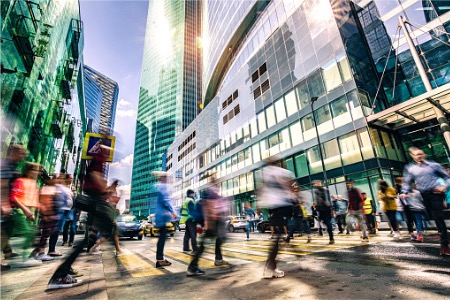The COVID-19 pandemic took the world by storm this year, and it shows no signs of going away soon. It seems that, for the time being, we’ll have to get used to “the new normal”. But what does that look like for the real estate market? The virus and all attempts to stop it have already changed how we work, travel, even shop for groceries. Indeed, buying a house is going to look different in this new world too. It’s still hard to say precisely which changes are here to stay for good and which are just temporary. But one thing is for sure: the health crisis is affecting buyers in urban areas at the moment. In some ways, city dwellers looking for a real estate investment have an advantage because of this. In other ways, however, buying a home in the city right now is more challenging than ever.
There is less competition for urban properties at the moment
Before the coronavirus pandemic struck, experts predicted 2020 would be one of the best years for real estate in decades. While those predictions never quite came true, they also weren’t that far off: most real estate agents are reporting postponements rather than cancellations from potential buyers. This proves that people are still very much interested in investing in real estate even now.
But what exactly people look for in a home is changing. At least temporarily, the focus has shifted away from urban properties with suburban and rural properties showing a significantly higher increase in views-per-property (13% and 16% respectively, compared to a 7% increase for urban properties). However, if you’re looking for a home in a metropolitan area, that works in your favor. With fewer people showing interest in such properties, it’ll be easier to find and purchase the perfect home in the city, because you won’t have as much competition.
New and better real estate is being built right now.
Just like with suburban and rural properties, more people are showing interest in new construction. As people spend more time at home during the pandemic, they realize what exactly makes a perfect home – open plans are becoming less popular, buyers are looking for bigger houses, and home offices are increasingly important. Thus, we can expect COVID-19 to affect home design as well. So if you’re looking to invest in the future, you can expect even better homes on the market soon.
How is the health crisis affecting buyers in urban areas negatively?
Unfortunately, buyers in urban areas will also see some negative impacts of the pandemic on the real estate market. Despite less competition and better offers, looking for a home may seem more difficult in many ways now than it was a year ago. However, this shouldn’t discourage you from looking for the perfect new property because agents have adapted and can show you homes in a safe and socially distanced manner.
People are less likely to sell and more likely to rent out.
If there’s anything we’ve learned from the COVID-19 pandemic with regards to real estate, it’s the importance of owning your home. Many renters who lost their jobs due to the crisis have found themselves struggling to pay rent and facing eviction. On the other hand, landlords have mainly maintained a steady income even in states that passed temporary rent collection restrictions. This may incentivize more people to purchase a property. However, it is also a reason why fewer people will want to sell their homes now – owning property (and especially multiple properties) has proven to be quite an asset that most won’t want to part with.
It is harder to find the perfect home through virtual viewings only
Due to the coronavirus safety measures, viewing homes in person is not always an option these days. Instead, most people get a virtual viewing through photos or videos. This may seem like one of the less relevant ways in which the health crisis is affecting buyers in urban areas, but it may actually have serious consequences. Inspecting a home in person allows you to get a better impression of it with all your senses: you’ll know not just how it looks but how it sounds, smells and feels. You’ll lose some of that experience in virtual viewings. Additionally, it is easier to hide imperfections in staged photos and videos than in person. To avoid surprises, follow these steps:
- work with a trusted real estate agent who knows the area and will only show you high-quality listings
- ask to see places that typically hide imperfections – under the furniture, behind the radiators, corners
- ask about the noise levels in the neighborhood
- try to schedule a socially distanced in-person viewing at a later date
Is the health crisis affecting urban property prices?
One of the most important questions about the health crisis affecting buyers in urban areas relates to the prices. Unfortunately, it would appear at this time that the crisis has not significantly impacted home prices in urban areas. It is hard to say if this will change as the pandemic continues. At this time, however, experts do not expect to see drastic trends towards cheaper real estate. In fact, prices may go up after the pandemic as people return to the cities.
But which of the effects we see right now will stay with us in the future (and for how long), and whether the overall impact will be positive or negative for buyers- remains to be seen.
Author’s bio
Ashley Koh is a professional journalist and interior design enthusiast. After buying a smart home in 2016, she developed a keen interest in following modern real estate trends. These days, she combines her two passions by covering real estate news for losangelestransfer.com. Her dream for the future is to one day design and build her own home.

